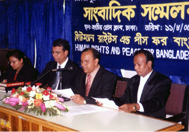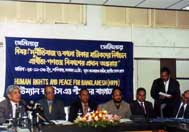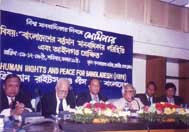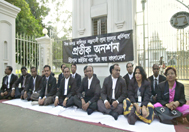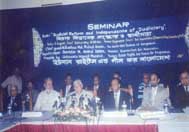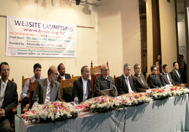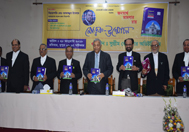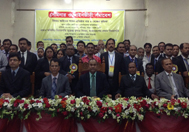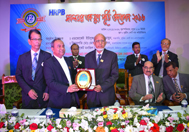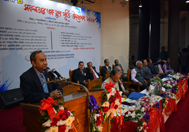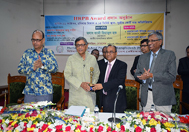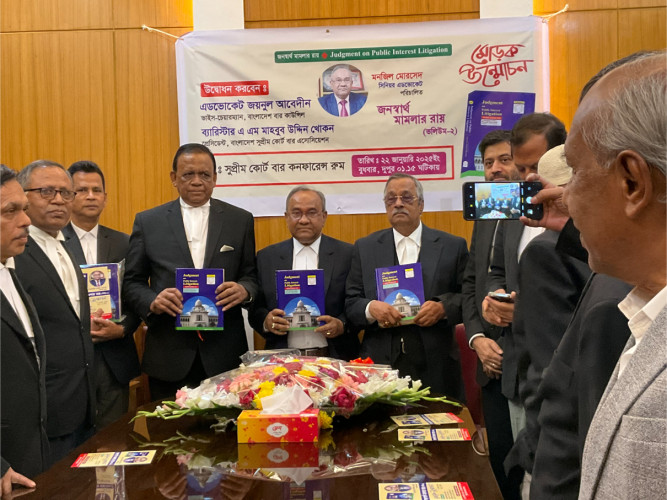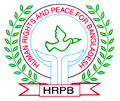You are here :: Mediation
Mediation
Mediation is a form of alternative dispute resolution (ADR), a way of resolving disputes between two or more parties with concrete effects. Typically, a third party, the mediator, assists the parties to negotiate settlement. Disputants may mediate disputes in a variety of domains, such as commercial, legal, diplomatic, workplace, community and family matters. In mediation usually a third party helps others reach agreement. More specifically, mediation has a structure, timetable and dynamics that √ҐвВђ≈Уordinary√ҐвВђ¬Э negotiation lacks. The process is private and confidential. Participation is typically voluntary. The organization HRPB acts as a mediator as a neutral third party and facilitates rather than directs the process. While a case in the hands of a lawyer or a court may take months or years to resolve, mediation usually achieves a resolution in a matter of hours. Taking less time means expending less money on hourly fees and costs. Mediation increases the control the parties have over the resolution. Mediation is more likely to produce a result that is mutually agreeable for the parties. Because the result is attained by the parties working together and is mutually agreeable, compliance with the mediated agreement is usually high. This further reduces costs. While court hearings are public, mediated remains strictly confidential. Parties to mediation are typically ready to work mutually toward a resolution. The parties are more amenable to understanding the other party√ҐвВђвДҐs side and work on underlying issues to the dispute. This has the added benefit of often preserving the relationship the parties had before the dispute. The mediator acts as a neutral facilitator and guides the parties through the process.
а¶Ѓа¶ІаІНа¶ѓа¶ЄаІНඕටඌ
а¶Жබඌа¶≤ටаІЗа¶∞ а¶ђа¶Ња¶За¶∞аІЗ а¶ђа¶ња¶∞аІЛа¶І ථගඣаІН඙ටаІНටග а¶Ха¶∞а¶Ња¶∞ а¶Па¶Ха¶Яа¶њ а¶ХаІМපа¶≤ а¶єа¶≤ а¶Ѓа¶ІаІНа¶ѓа¶ЄаІНඕටඌ, а¶ѓа¶Ња¶∞ а¶Ѓа¶Ња¶ІаІНа¶ѓа¶ЃаІЗ බаІБ а¶ђа¶Њ ටටаІЛа¶Іа¶ња¶Х а¶ђаІНа¶ѓа¶ХаІНටගа¶∞ а¶Ѓа¶ІаІНа¶ѓаІЗ ඁට඙ඌа¶∞аІНඕа¶ХаІНа¶ѓ බаІБа¶∞ а¶Ха¶∞а¶Ња¶∞ ඙аІНа¶∞а¶ХаІНа¶∞а¶њаІЯа¶Њ а¶Ъа¶Ња¶≤ඌථ а¶єаІЯа•§ а¶ЃаІБа¶≤ට ටаІГටаІАаІЯ а¶Па¶Ха¶Ьථ ඙а¶ХаІНа¶Ј а¶Ѓа¶ІаІНа¶ѓа¶ЄаІНඕටඌ а¶Ха¶∞аІЗ ඙а¶ХаІНඣබаІНа¶ђаІЯа¶ХаІЗ а¶Ѓа¶ња¶Ѓа¶Ња¶Ва¶Єа¶Њ а¶Ха¶∞ටаІЗ а¶Єа¶Ња¶єа¶Ња¶ѓаІНа¶ѓ а¶Ха¶∞аІЗ, а¶ѓаІЗа¶ЦඌථаІЗ а¶ђа¶ња¶∞аІЛа¶ІаІЗа¶∞ ඙а¶ХаІНа¶Ја¶ЧаІБа¶≤аІЛ а¶ђа¶ња¶≠ගථаІНථ а¶ђа¶ња¶∞аІЛа¶І, а¶ХаІБа¶ЯථаІИටගа¶Х, а¶ђаІНа¶ѓа¶Ња¶ђа¶Єа¶ЊаІЯа¶ња¶Х, а¶Жа¶Зථа¶Чට, а¶Ха¶∞аІНа¶Ѓа¶ЄаІНඕа¶≤аІЗа¶∞ а¶ђа¶ња¶∞аІЛа¶І а¶ђа¶Њ ඙ඌа¶∞а¶ња¶ђа¶Ња¶∞а¶ња¶Х а¶Єа¶Ѓа¶ЄаІНа¶ѓа¶Њ ඪඁඌ඲ඌථ а¶Ха¶∞а¶Њ а¶єаІЯа•§ а¶Ѓа¶ІаІНа¶ѓа¶ЄаІНඕටඌаІЯ а¶Єа¶Ња¶Іа¶Ња¶∞ථට ටаІГටаІАаІЯ а¶Па¶Ха¶Яа¶њ ඙а¶ХаІНа¶Ј а¶ЕථаІНඃබаІЗа¶∞а¶ХаІЗ а¶ЪаІБа¶ХаІНටගටаІЗ ඙аІМа¶ЫඌටаІЗ а¶Єа¶єа¶Ња¶ѓаІНа¶ѓ а¶Ха¶∞аІЗа•§ а¶Па¶Яа¶њ а¶Па¶Ха¶Яа¶њ а¶∞аІЗа¶ЬаІЗа¶≤а¶ња¶Йපථ а¶ХаІМපа¶≤ а¶ѓаІЗа¶ЦඌථаІЗ ටаІГටаІАаІЯ ඙а¶ХаІНа¶Ј а¶Ѓа¶Ња¶Ѓа¶≤а¶Ња¶∞ а¶Єа¶Ња¶ХаІНа¶ЈаІНа¶ѓ ඙аІБථа¶Га¶ђа¶ња¶ђаІЗа¶Ъථඌ/඙аІБථа¶Гථගа¶∞аІАа¶ХаІНඣථ а¶Ха¶∞аІЗ а¶Па¶ђа¶В а¶Жа¶Зථа¶Чටа¶≠а¶Ња¶ђаІЗ а¶Йа¶≠аІЯ඙а¶ХаІНа¶ЈаІЗа¶∞ а¶ЬථаІНа¶ѓ а¶ђа¶Ња¶ІаІНа¶ѓа¶Ха¶∞ а¶Па¶ђа¶В а¶ђа¶≤а¶ђаІОа¶ѓаІЛа¶ЧаІНа¶ѓ ඪගබаІН඲ඌථаІНට බаІЗа¶®а•§ а¶Ѓа¶ІаІНа¶ѓа¶ЄаІНටටඌ а¶ЄаІНа¶ђаІЗа¶ЪаІНа¶Ыа¶Ња¶ЃаІБа¶≤а¶Х а¶ђа¶Њ а¶ђа¶Ња¶ІаІНඃටඌඁаІВа¶≤а¶Х යටаІЗ ඙ඌа¶∞аІЗа•§ а¶Ѓа¶ІаІНа¶ѓа¶ЄаІНටටඌ а¶Па¶Ха¶Яа¶њ ඙аІНа¶∞а¶ХаІНа¶∞а¶њаІЯа¶Њ а¶ѓаІЗа¶ЦඌථаІЗ а¶Па¶Ха¶Яа¶њ а¶ђа¶ња¶∞аІЛа¶І ඪඁඌ඲ඌථ а¶Ха¶∞а¶Њ а¶єаІЯ ථගа¶∞඙аІЗа¶ХаІНа¶Ј ඪගබаІН඲ඌථаІНට බඌටඌа¶∞/а¶ђа¶ња¶Ъа¶Ња¶∞а¶ХаІЗа¶∞ а¶Ѓа¶Ња¶ІаІНа¶ѓа¶ЃаІЗ а¶Па¶ђа¶В а¶ђа¶ња¶∞аІЛа¶ІаІЗа¶∞ ඙а¶ХаІНа¶Ја¶ЧаІБа¶≤аІЛ а¶Єа¶ЃаІНඁට а¶єаІЯ а¶ѓаІЗ а¶Ѓа¶ІаІНа¶ѓа¶ЄаІНඕටඌа¶Ха¶Ња¶∞а¶ња¶∞ ඪගබаІН඲ඌථаІНට а¶ЪаІВаІЬඌථаІНට а¶Па¶ђа¶В а¶ђа¶Ња¶ІаІНа¶ѓа¶Ха¶∞ а¶єа¶ђаІЗа•§ а¶Ѓа¶ІаІНа¶ѓа¶ЄаІНඕටඌ а¶єа¶≤ а¶Пඁථ а¶Па¶Ха¶Яа¶њ а¶ђаІНа¶ѓа¶ђа¶ЄаІНඕඌ а¶ѓаІЗа¶ЦඌථаІЗ ඙а¶ХаІНඣබаІНа¶ђаІЯ а¶Па¶Хඁට а¶єаІЯаІЗ а¶Ха¶Ња¶Ь а¶Ха¶∞ටаІЗ а¶∞а¶Ња¶Ьа¶њ а¶єаІЯа•§ а¶Ѓа¶ІаІНа¶ѓа¶ЄаІНඕටඌ а¶Ѓа¶Ња¶Ѓа¶≤а¶Ња¶∞ а¶Ца¶∞а¶Ъ а¶Ха¶Ѓа¶ЊаІЯа•§ а¶ХаІЛа¶∞аІНа¶ЯаІЗа¶∞ පаІБථඌථග а¶єаІЯ ඙аІНа¶∞а¶ХඌපаІНа¶ѓаІЗ а¶ХගථаІНටаІБ а¶Ѓа¶ІаІНа¶ѓа¶ЄаІНඕටඌ а¶єаІЯ а¶ЧаІЛ඙ථаІАаІЯа¶≠а¶Ња¶ђаІЗа•§ ඙а¶ХаІНඣබаІНа¶ђаІЯ а¶ђа¶ња¶ЈаІЯ а¶Єа¶ЃаІН඙а¶∞аІНа¶ХаІЗ ඪගබаІН඲ඌථаІНට ඁඌථටаІЗ ඙аІНа¶∞а¶ЄаІНටаІБට ඕඌа¶ХаІЗ а¶Па¶ђа¶В а¶Па¶Яа¶Њ а¶≠а¶ђа¶ња¶ЈаІНඃටаІЗ а¶Єа¶ЃаІН඙а¶∞аІНа¶ХаІЗа¶∞ а¶ЙථаІНථаІЯаІЗථаІЗа¶∞ а¶ХаІНа¶ЈаІЗටаІНа¶∞аІЗ а¶Єа¶єа¶ЊаІЯа¶Х а¶єаІЯа•§ а¶Ѓа¶ІаІНа¶ѓа¶ЄаІНඕටඌ а¶Ха¶Ња¶∞а¶њ ථගа¶∞඙аІЗа¶ХаІНа¶Ј ඕаІЗа¶ХаІЗ ඙а¶ХаІНඣබаІНа¶ђаІЯа¶ХаІЗ а¶ђа¶ња¶∞аІЛа¶І ථගඪаІН඙ටаІНටගටаІЗ а¶Єа¶єа¶ЊаІЯටඌ а¶Ха¶∞аІЗа•§

